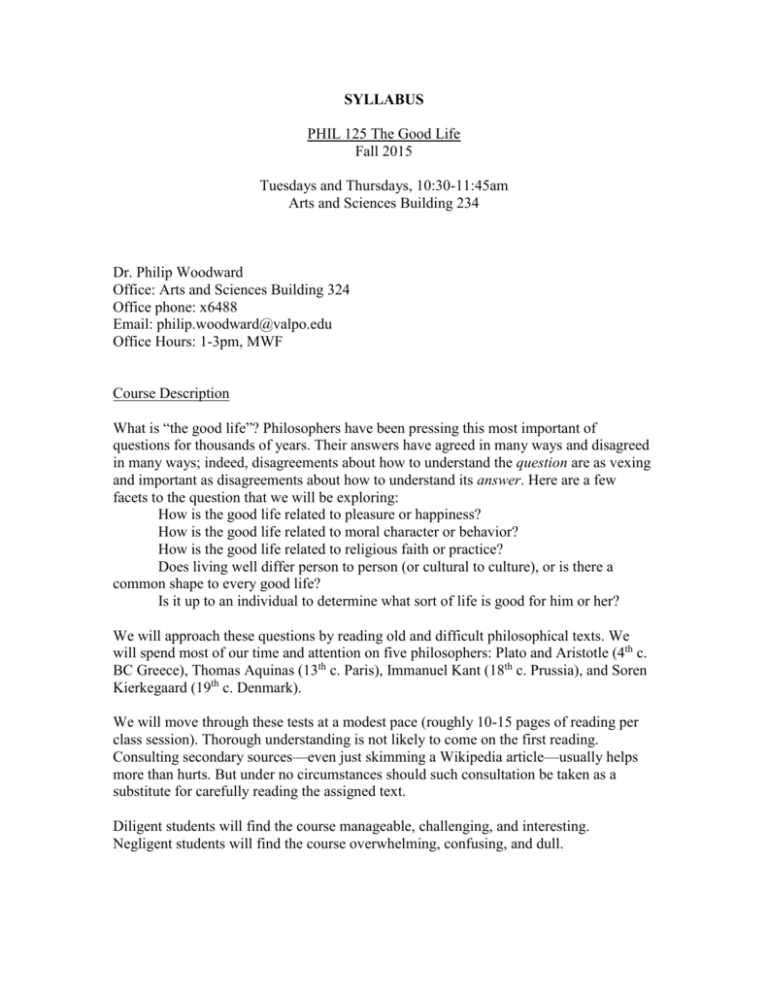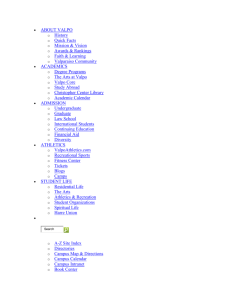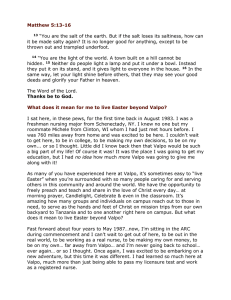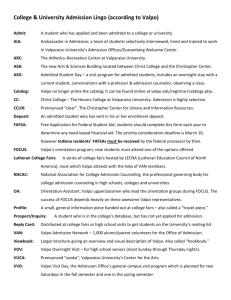Here - Phil Woodward
advertisement

SYLLABUS PHIL 125 The Good Life Fall 2015 Tuesdays and Thursdays, 10:30-11:45am Arts and Sciences Building 234 Dr. Philip Woodward Office: Arts and Sciences Building 324 Office phone: x6488 Email: philip.woodward@valpo.edu Office Hours: 1-3pm, MWF Course Description What is “the good life”? Philosophers have been pressing this most important of questions for thousands of years. Their answers have agreed in many ways and disagreed in many ways; indeed, disagreements about how to understand the question are as vexing and important as disagreements about how to understand its answer. Here are a few facets to the question that we will be exploring: How is the good life related to pleasure or happiness? How is the good life related to moral character or behavior? How is the good life related to religious faith or practice? Does living well differ person to person (or cultural to culture), or is there a common shape to every good life? Is it up to an individual to determine what sort of life is good for him or her? We will approach these questions by reading old and difficult philosophical texts. We will spend most of our time and attention on five philosophers: Plato and Aristotle (4th c. BC Greece), Thomas Aquinas (13th c. Paris), Immanuel Kant (18th c. Prussia), and Soren Kierkegaard (19th c. Denmark). We will move through these tests at a modest pace (roughly 10-15 pages of reading per class session). Thorough understanding is not likely to come on the first reading. Consulting secondary sources—even just skimming a Wikipedia article—usually helps more than hurts. But under no circumstances should such consultation be taken as a substitute for carefully reading the assigned text. Diligent students will find the course manageable, challenging, and interesting. Negligent students will find the course overwhelming, confusing, and dull. Course Objectives Becoming acquainted with the most important streams of thought in the Western intellectual tradition with respect to the human good Learning to read, understand, reconstruct and critically evaluate philosophical views and arguments Producing clear, organized, cogent philosophical writing Developing for oneself a reflective, historically-informed understanding of the good for one’s life—as a piece of the broader formation of worldview and identity that a Valpo education affords Course Requirements / Grading Regular attendance First Exam Second Exam Final Exam Final Paper Worldview Summaries (x5) 15% 15% 20% 25% 25% Worldview Summaries are about two pages long. Each will focus on the thought of one philosopher, answering the following questions: (1) What is this philosopher’s central conception of the good human life? (2) What reasons does he give (or hint at giving) in defense of his position? (3) What objections do you have to either his position, or to the reasons he gives for it? You should be taking careful notes on the readings and the class discussions in preparation for these writing assignments. More detailed instructions to follow. Worldview Summaries earn one of three grades: 5 points (for excellent work), 4 points (for adequate work), or 0pts (for inadequate work). Inadequate work may be resubmitted, with the potential of earning 2-4 points. Resubmissions are due one week after initial submissions have been returned to students. Final Papers will be 4-6 pages long. You will explain and defend a conception of the human good, whether that of one of the philosophers we have studied, or some alternative. You will trace arguments for/against your position through at least 3 of the thinkers in the class. Final papers are to be submitted electronically on Blackboard by 11:59pm, Friday Dec. 11 (the final day of classes for the fall term). More detailed instructions to follow. You are strongly encouraged to meet with the VU Writing Center (http://www.valpo.edu/writingcenter/) to discuss drafts of your Final Papers. I am happy to discuss paper ideas with you at any time, but I will only read through a draft after you have met with the Writing Center. Exams will include multiple-choice, short-answer, and essay questions. Required Texts Cahn & Markie, Ethics: History, Theory, and Contemporary Issues, Fifth Edition. Oxford University Press, 2011. ISBN: 9780199797264 Other readings available on Blackboard Course Policies Attendance: It is expected that you will be in attendance, on time, and prepared for every scheduled class session. While there are no excused absences in this class*, you are entitled to two “free” absences. Each additional absence will result in a 2% deduction from your final grade. Chronic tardiness will result in grade penalties as well. *Absences owing to participation in VU athletic events, religious observances, or grave medical emergencies do not count toward your “free” absences, if these absences are properly documented. Late work: Exams cannot be taken late, apart from an emergency circumstance, later documented. If you have a schedule conflict, you may take an exam earlier than scheduled. However, you must notify me at least ten days in advance to arrange for an alternate day/time. Worldview Summaries will not be accepted late (either in the form of an initial submission or a resubmission). Final Papers may be submitted late at the cost of one letter grade per day. Electronic devices: Laptops, tablets, and phones, and suchlike are not permitted in this class. Honor Code: The Honor Code must be written and signed on every assignment and exam. In accord with the Code, all students must pledge not to give or receive unauthorized aid. Additionally, students are obligated to report violations of the Honor Code to the Honor Council. Violations may result in failing this course or in being suspended or expelled from the University. For details see: http://www.valpo.edu/student/honorcouncil/honorcode.php. You are encouraged to discuss course materials with fellow students on a regular basis; this is the best way to uncover gaps in your understanding and to cement what you do understand. Study groups for exams are encouraged. It is fine to discuss the content of writing assignments with other students, but every step of the writing process— conception, organization, composition—must be executed by you alone. Email and class cancelation: The best way to get in touch with me is to email me. Expect a reply within 24 hours on weekdays, and inconsistent replies on the weekends. I do not answer student questions about exams in the 24 hours preceding the exam. If I need to get in touch with you, I will use your Valpo email address. This is also how I will alert the class in the event of an unscheduled class cancelation. I expect that you are checking your Valpo email at least once per day. Academic support services If you find that you are struggling or feeling confused or frustrated, come to office hours or email me requesting an appointment. The next step is to use the Academic Success Center (ASC) online directory (valpo.edu/academicsuccess) or contact the ASC (academic.success@valpo.edu) to help point you in the right direction for academic support resources for this course. Valpo’s learning centers (Writing Center, Language Resource Center, and Academic Success Center) offer excellent support services free of charge. Library support services For recommendations regarding research resources for your Final Paper, talk to me or click the link to Library Guides within the Blackboard table of contents. Judy Miller (http://library.valpo.edu/faculty/miller.html) is the librarian assigned to supporting philosophical research. Disability support: Please contact Mr. Zebadiah Hall at Disability Support Services (zebadiah.hall@valpo.edu), if you believe you have a disability that might require a reasonable accommodation in order for you to perform as expected in this class. Mr. Hall will work with you and me directly to make sure you receive any reasonable accommodation needed as the result of a disability. TENTATIVE SCHEDULE 8/25 8/27 Plato, “Euthyphro” (pp. 5-16) 9/1 9/3 Plato, “Defense of Socrates,” 17a-28b (pp. 16-24) Plato, “Defense of Socrates,” 28b-42a (pp. 24-33) 9/8 9/10 Plato, “Phaedo,” (pp. 42-44); Republic, Book I: 327a-336a (pp. 44-51) Plato, Republic, Book I: 336b-354c (pp. 51-64) 9/15 9/17 Plato, Republic, Books II & III (pp. 65-82) Plato, Republic, Book IV (pp. 82-96) 9/22 Aristotle, Nicomachean Ethics, Book I, sections 1-5, 7 (pp. 124-26, 128-29); Physics *Blackboard *Plato Worldview Summary due 9/24 Aristotle, Nicomachean Ethics, Book II, sections 1-2, 4-7 (pp. 134-40) 9/29 10/1 10/6 10/8 Aristotle, Nicomachean Ethics, Book VIII, sections 1-3, 9; Book IX, section 4, 8, 9, 12 (161-64, 166-69) Aristotle, Nicomachean Ethics, Book X, sections 4-8 (169-75) FIRST EXAM Thomas Aquinas, Summa Contra Gentiles *Blackboard *Aristotle Worldview Summary due 10/13 Thomas Aquinas, “Treatise on Law” *Blackboard 10/15 Thomas Hobbes, Leviathan Chapters VI, XI & XIII (pp. 236-41) 10/20 Thomas Hobbes, Leviathan Chapters XIV and XV (pp. 241-47) *Aquinas Worldview Summary due 10/22 FALL BREAK 10/27 Immanuel Kant, Groundwork for the Metaphysics of Morals, Preface & Chapter I (pp. 313-22) 10/29 Immanuel Kant, Groundwork for the Metaphysics of Morals, Chapters II & III (pp. 325 [right column]-334) 11/3 11/5 SECOND EXAM 11/10 Friedrich Nietzsche, On the Genealogy of Morals, Preface & First Essay (pp. 397405) & Jean-Paul Sartre, Existentialism is a Humanism (pp. 441-47) *Kant Worldview Summary due 11/12 Soren Kierkegaard, Fear and Trembling, pp. 116-34 [Blackboard] 11/17 Soren Kierkegaard, The Sickness Unto Death, pp. 339-51 [Blackboard] 11/19 Soren Kierkegaard, The Sickness Unto Death, pp. 351-71 [Blackboard] 11/24 THANKSGIVING BREAK 11/26 THANKSGIVING BREAK 12/1 12/3 Alasdair MacIntyre, After Virtue, Chapter 5: “Why The Enlightenment Project of Justifying Morality Had to Fail” [Blackboard] *Kierkegaard Worldview Summary due Martha Nussbaum, “Non-Relative Virtues: An Aristotelian Approach”, Sections 1-4 (pp. 755-64) Martha Nussbaum, “Non-Relative Virtues: An Aristotelian Approach”, Sections 5-8 (pp. 764-72) 12/10 Richard Taylor, “The Meaning of Life” (pp. 976-82) 12/8 Friday, 12/11: Final Paper due by 11:59pm on Blackboard Monday, 12/14: FINAL EXAM, 10:30-12:30








